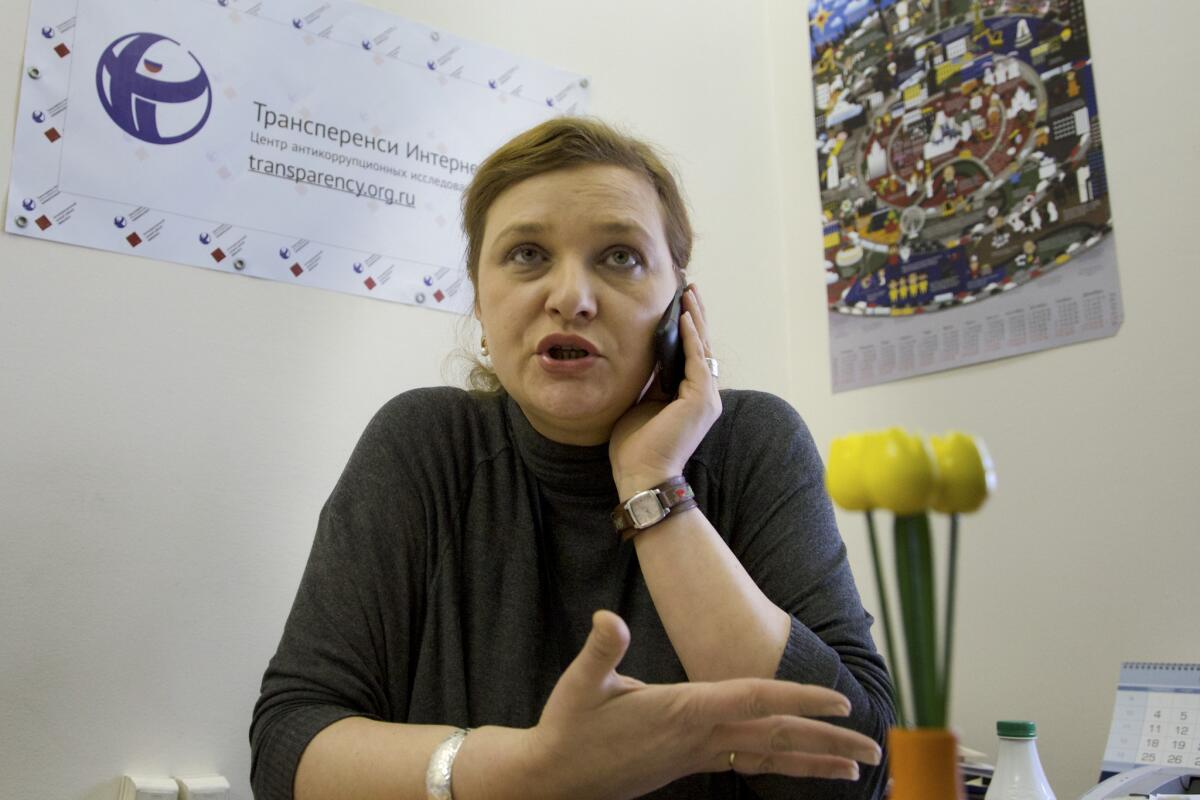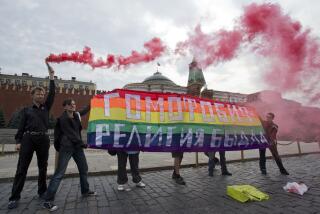‘Massive’ wave of Russian state inspections of NGOs continues

Russian officials pressed ahead Wednesday with a sweeping wave of inspections on nonprofit foundations, human rights groups and other NGOs that has troubled activists in Russia and abroad. In the latest round, state inspectors showed up at the offices of Human Rights Watch and Transparency International.
Four government officials -- two from the Moscow prosecutor’s office, one from the Ministry of Justice and one involved in tax inspection -- arrived at Transparency International with a letter seeking office policies, financial documents and other papers, director Elena Panfilova said Wednesday.
“The funny thing is, we underwent a planned inspection from the Ministry of Justice in February, and received a report that we were all clean and fine,” Panfilova said. When the officials came Wednesday, she said, “they asked for the same documents that we submitted to the ministry in February.”
Panfilova said her staff was merely puzzled by the repeated inspections, not alarmed, but the increased government attention to such groups has stoked concerns of intimidation among others. Human Rights Watch, which also was inspected Wednesday, has complained that the investigations feed into a “menacing atmosphere.”
The two groups are only the latest in a long list to face state scrutiny in recent weeks.
“This is a very disturbing development designed to send a chill through civil society,” said Freedom House President David Kramer, whose group doesn’t have offices in Russia. “They’re on a witch hunt, looking for any documents they can use to distort” what NGOs do.
Last year Russia ushered in new rules requiring many nongovernmental organizations that receive foreign funding to register as “foreign agents” or risk fines, restrictions on public protest and imprisonment. Russian leaders also passed a law to allow the suspension of Russian groups with U.S. funding that engage in “political activities.”
Activists suspect a February speech triggered the recent tide of inspections. Addressing its federal security service, President Vladimir Putin said foreign interference in Russian internal affairs was unacceptable.
“We have a set of rules and regulations for NGOs in Russia, including rules and regulations about foreign funding. These laws, naturally, should be enforced,” Putin said.
As many as 2,000 groups have been searched in the past month, presidential human rights council member Pavel Chikov told the Associated Press. His legal defense group, Agora, was reportedly among those inspected Wednesday. Chikov himself will face questioning by a state prosecutor next week, the Russian Legal Information Agency reported.
“This is the most massive wave of inspections I’ve ever seen in 21 years working at Human Rights Watch on Russia,” said Rachel Denber, deputy director of its Europe and Central Asia division.
Human rights group Amnesty International, which said it was inspected Monday along with three prominent Russian organizations, expressed concern that such visits were “carried out in such a way as to deliberately stigmatize and discredit NGOs in the eyes of the public.” Some of the unannounced inspections have been accompanied by state television crews, according to rights groups.
“The bigger fear is that this is just round one, and that, after the smearing, the forced closures will come,” Amnesty International’s Europe and Central Asia director, John Dalhuisen, said in a statement Friday as inspections ramped up.
The German Konrad-Adenauer-Foundation, which is affiliated with the political party of German Chancellor Angela Merkel, said inspectors who arrived Tuesday confiscated computers, saying they needed to check software licenses. Its chairman, Hans-Gert Pöttering, called the visit “worrying.”
Russian backers of the law have defended the increased attention to NGOs as needed and valid. The author of the “foreign agent” law denied it would smear government critics.
“I think the idea that ‘foreign agent’ means ‘spy’ is more of a hangover from the Soviet period in which our parents grew up,” Alexander Sidyakin told the Russian state news agency last year. “I believe there is nothing insulting in this term.”
ALSO:
Gay marriage: Where is it legal?
Radical cleric in Britain wins another appeal to avoid extradition
Message to Russian oligarchs: Your money’s just as safe at home
More to Read
Sign up for Essential California
The most important California stories and recommendations in your inbox every morning.
You may occasionally receive promotional content from the Los Angeles Times.










